The high-resolution palynological study of the varved sediments of Lake Montcortès has provided a unique record of the regional vegetation shifts over the last 3000 years and of the natural and anthropogenic drivers of ecological change, unparalleled in the Mediterranean.
This book shows in detail how the terrestrial ecosystems of Montcortès have responded to climatic events such as the Medieval Climate Anomaly or the Little Ice Age, as well as to varying intensities of anthropogenic pressure from the Bronze Age to the present. The knowledge gained from this palaeoecological study is useful not only for understanding how the modern landscapes of the Pyrenees were shaped, but also for conserving biodiversity and ecosystems in the face of future environmental changes related to ongoing global change.
The book is aimed at researchers, university teachers and advanced graduate students in a wide range of disciplines including ecology, palaeoecology, environmental science, biodiversity, geography, sedimentology, archaeology, anthropology, and biodiversity conservation.
Table of Content
Chapter 1. Introduction.- Chapter 2. The Caribbean Mangroves Today.- Chapter 3. Eocene Origin.- Chapter 4. Oligocene Revolution.- Chapter 5. Neogene Diversification.- Chapter 6. The Pelliciera Taxon Cycle: A Time-Continuum Integrative Synthesis.- Chapter 7. Quaternary Shifts and Anthropization.- Chapter 8. Rise and Fall: Summary and Conservation Insights.
About the author
Valentí Rull:
Senior Researcher. Botanic Institute of Barcelona, Spanish National Research Council (CSIC), Barcelona, Spain.
Associate Researcher. Institut Català de Paleontologia Miquel Crusafont (ICP-CERCA), Universitat Autònoma de Barcelona, Cerdanyola del Vallès, Barcelona, Spain.
Biologist (1981), Ph D in Palaeoecology (1990). Research interests: ecological, evolutionary and biogeographical applications of palynology. Experience in tropical, subtropical and temperate continental and insular biomes. Publications: 14 books and over 300 articles (>200 in JCR journals). Listed in the Stanford World’s Top 0.5% paleontologists and Top 10 palynologists (career-long and last-year versions).
Teresa Vegas-Vilarrúbia: Biologist, Ph D in Ecology (40 years of experience). Associate Professor at the University of Barcelona (Spain). Research interests: Ecology and paleolimnology, environmental impact and biotic response to current and past climate change, anoxia in lakes and its causes, mountain lakes as sentinels of global change. 13 book chapters, about 100 articles. Supervised 10 Ph D theses and 12 master’s theses.












